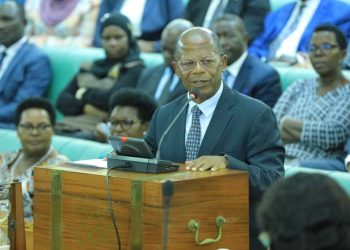“You behaved like a beast…and this behavior cannot be tolerated.” “I sentence all of you to save for A4 (Stephen Lwanga) to 40, 30 and 20 years in jail for murder, kidnap and aggravated robbery respectively,” High Court judge Flavia Anglin Ssenoga said as she sentenced city car dealer Muhammad Ssebuwufu and six others yesterday.
The judge sentenced Ssebuwufu and his co-accused to a total of 90 years imprisonment for the murder of businesswoman Betty Donah Katusabe over a sh9m car debt. Other convicts are Paul Tasingika, Shaban Odutu alias Golola, Philip Mirambe, Godfrey Kayiza, Yoweri Kitayimbwa, and Damaseni Ssentongo.
The convicts battered Katusabe to death on October 21, 2015, at Pine car depot on Lumumba Avenue in Kampala over a sh9m car debt. The depot was at the times a stone’s throw away from the Kampala Central Police Station. However, the judge ruled that Ssebuwufu and his colleagues will serve the sentence concurrently, meaning they will spend no more than 40 years in jail.
The judge also ordered that the period the convicts have been in jail on remand should be taken into account. Ssebuwufu, 36, and his co-convicts were further ordered to pay the family of the victim sh100m. Justice Ssenoga noted that Ssebuwufu, a father of seven children, and his cronies did not deserve a lenient sentence going by the cruel manner in which they committed the murder. “You ought not to take the law in your hands.
You had the opportunity to recover your money through the legal means but you chose to assault the woman to death. You deserve no mercy despite the fact that you have families and other dependants so that you learn and also act as an example to likely offenders,” the judge said. “The offenses you committed negatively impacted the victim’s family, relatives and the public at large,” she added.
The prosecution led by Assistant Director of Public Prosecution Alex Michael Ojok had asked the court to condemn the convicts to death, arguing that the case was “rarest of the rare cases” under the sentencing guidelines. But the judge declined to sentence the convicts to death, citing the Susan Kigula petition.
“Rarest of the rare cases” is where a court is satisfied that the commission of the offense was planned or meticulously premeditated and executed. “Looking at the facts of this case, this was a well-planned act because a forged case was opened at CPS, the victim was picked and instead taken to pine car bond where she was tortured to death,” Ojok submitted.
In the Kigula petition, the Supreme Court nullified laws providing for a mandatory death sentence. The judges were then granted discretion to either sentence a capital offense convict to death, life imprisonment or to a long jail term. Justice Ssenoga also sentenced the special hire driver, Stephen Lwanga to seven years in jail for being an accessory to the crime.
This means that Lwanga who has been on remand since 2015 will have to stay in jail for another three years and three months before regaining his freedom. Lwanga, 58, was hired by Ssebuwufu to transport Katusabe, in the company of two Police officers, to CPS in Kampala at a fee of sh20,000.
During mitigation, Ojok and his prosecution colleague Winfred Ahimbisibwe submitted that the convicts deserved no mercy basing on the torture they subjected to the deceased on a fateful day. “The deceased was picked from her residence at Bwebajja under a false theft case purportedly reported at Central Police Station in Kampala.
She was transported to Pine car bond where she was subjected to torture and humiliation: her clothes were torn hence exposing her privacy to the public. We, therefore, invite this court to hand a death sentence to the convicts, save for A4 who was convicted of a lesser offense,” Ahimbisibwe submitted.
“This court being the guardian and promoter of rule of law in this country, peaceful and just society should send a clear signal to the convicts and any person of like nature that the conduct of this kind shall not be tolerated,” Ojok submitted.
Defence submissions
However, the lawyers for the accused, Caleb Alaka, Evans Ochieng and Robert Irumba, told the court that the death sentence was not justifiable going by on the facts of the case. “My lord, we suggest that 10-year custodial sentence, in this case, is appropriate basing on the facts on the court record,” Ochieng submitted.
Alaka submitted that sentencing is not a question of emotion but law. “The character of the convicts is not the same and each has a peculiar case,” Alaka said imploring the judge to ignore the prosecution’s submission. Ssebuwufu pleaded with the judge for a lenient sentence, saying that he has an orphanage he is running in addition to having children of his own.
Ssebuwufu to appeal
Immediately after the sentence was announced, the defense lawyers informed the judge that their clients were going to appeal the judgment because they are dissatisfied with their conviction and sentence. “The judgment is ready but the record will take some time because we need to make some corrections,” the judge responded.
Relatives of victim cheerful
Robert Muhindo who described himself as a brother of the deceased, said they are happy with the court’s verdict. “The judge in her wisdom has sentenced the accused to 40 years and we are satisfied with it. We are also happy with the sh100m she has awarded to the family although it is not worth my sister’s life,” the visibly jovial Muhindo said.
Ssebuwufu’s defence
In his defense, Ssebuwufu contended that although he had sold a Toyota Premio registration number UAX 481H to the deceased with an outstanding balance, he had already secured it through a cheque and that had no reason to hunt for her. Tasingika, in his defense, claimed that he was merely hired by Sam Kiwanuka to pick Katusabe from Bwebajja in the company of police officers.





























































